So, here we are in the midst of an inflation and cost of living crisis, Canadians still processing the most recent punch to the gut courtesy of the Bank of Canada, and we have politicians out there showing us repeatedly just how little they get it.
Butter is $9 and Chrystia Freeland is taking victory laps on how inflation is back under control. You know, everywhere except the grocery store where it’s never been worse.
Housing unaffordability has never been more severe and Toronto Mayor Olivia Chow is pleased to support the notion of homeowners being bequeathed the right to add expensive secondary suites within their homes to help ease the burden of carrying costs.
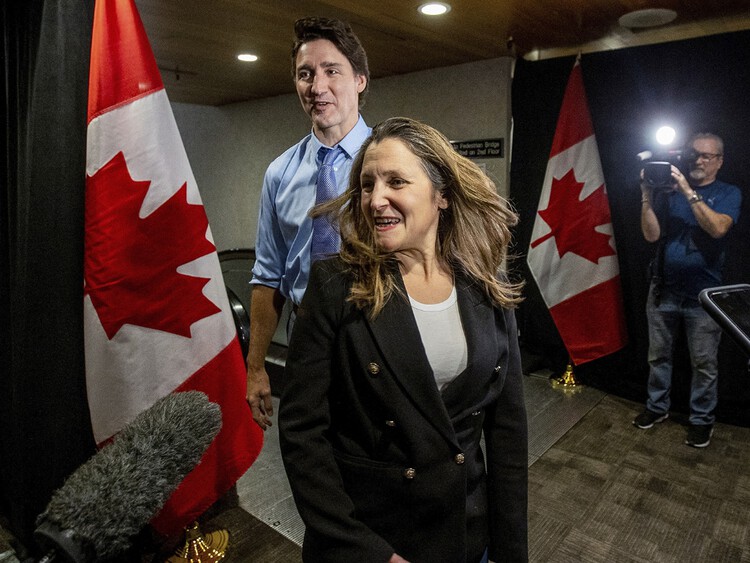
 apple.news
Either the Trudeau Liberals are financially illiterate, or they’re hoping you are.
apple.news
Either the Trudeau Liberals are financially illiterate, or they’re hoping you are.
The Liberals have been doing a victory lap this week after inflation fell to 2.8% in June compared to the same period a year earlier.
That sounds great. In fact, after hitting a recent inflation high of 8.1% a year ago, it sounds amazing. Here’s the problem: It’s almost all driven by a drop in the price of gas compared to a year ago while food prices, rent and mortgage payments continue to spiral out of control.

 apple.news
Bakery products were up 12.9% in June compared to a year ago, fresh fruit was up 10.4%, dairy was up 7.4% and meat 6.9%. No matter what kind of diet you’re following, food is far more expensive than it used to be, but the Trudeau Liberals want you to know that you’ve never had it so good.
apple.news
Bakery products were up 12.9% in June compared to a year ago, fresh fruit was up 10.4%, dairy was up 7.4% and meat 6.9%. No matter what kind of diet you’re following, food is far more expensive than it used to be, but the Trudeau Liberals want you to know that you’ve never had it so good.
Housing costs, meanwhile, are skyrocketing, and not just the average selling price for a home. Two years ago, the Bank of Canada’s key interest rate was 0.25%, a year ago it was 1.50% and today it stands at 5%.
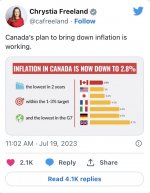
“Mortgage interest costs have also significantly increased, rising over 30% in the past year due to the Bank of Canada’s attempts to control inflation,” they added. Add in rent jumping 5.8% in the past year, and that adds up to a gaping hole in many people’s pocket.
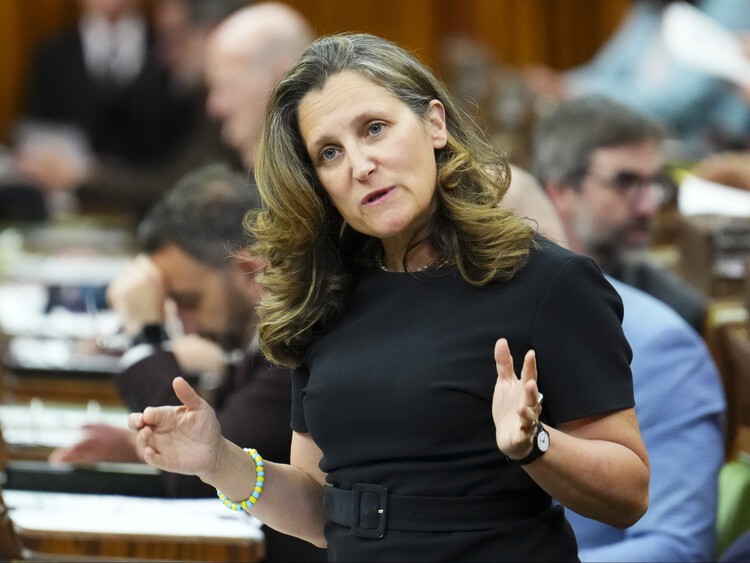
 apple.news
Another pointed out the carbon tax having an impact on the cost of living.
apple.news
Another pointed out the carbon tax having an impact on the cost of living.
“This makes no sense and doesn’t reflect the carbon tax that has made everything cost more,” the person wrote. “Groceries have not come down in price…. Everything hurts in the wallet right now!
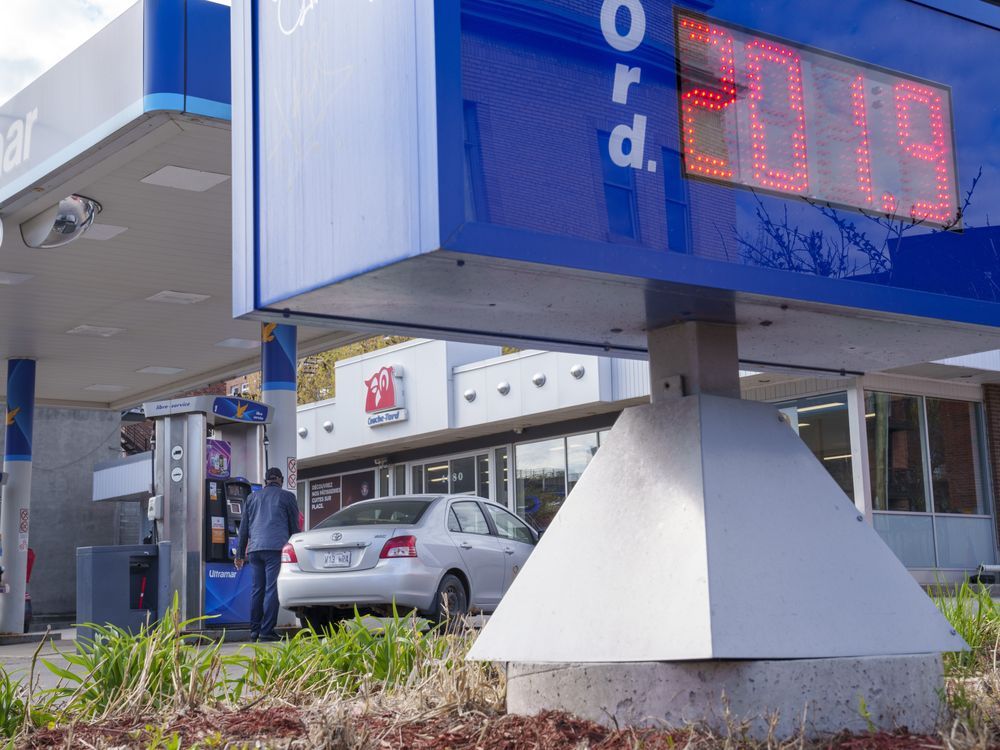
 torontosun.com
torontosun.com
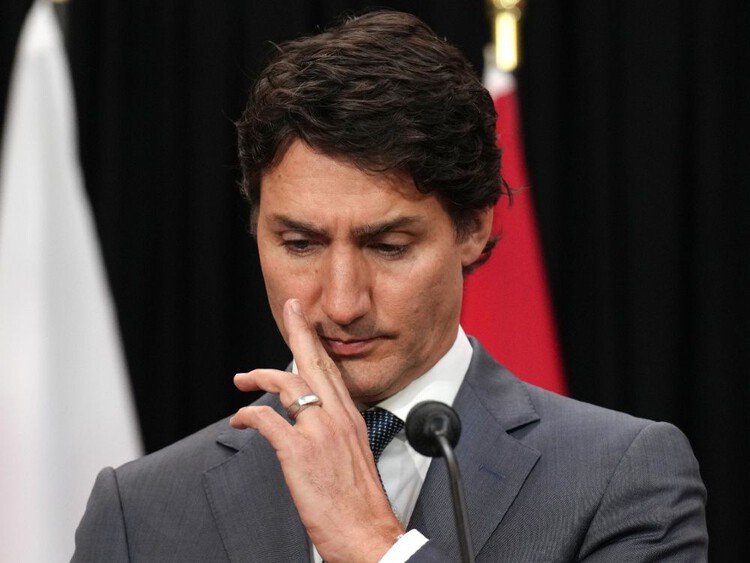
 apple.news
apple.news
Butter is $9 and Chrystia Freeland is taking victory laps on how inflation is back under control. You know, everywhere except the grocery store where it’s never been worse.
Housing unaffordability has never been more severe and Toronto Mayor Olivia Chow is pleased to support the notion of homeowners being bequeathed the right to add expensive secondary suites within their homes to help ease the burden of carrying costs.
LACKIE: These are our leaders? — Toronto Sun
We are in the midst of an inflation and cost of living crisis and we have politicians showing us repeatedly just how little they get it.
The Liberals have been doing a victory lap this week after inflation fell to 2.8% in June compared to the same period a year earlier.
That sounds great. In fact, after hitting a recent inflation high of 8.1% a year ago, it sounds amazing. Here’s the problem: It’s almost all driven by a drop in the price of gas compared to a year ago while food prices, rent and mortgage payments continue to spiral out of control.
LILLEY: Trudeau Liberals claim victory on inflation as food, housing climb — Toronto Sun
Economists have said the growth in federal spending has contributed to inflation in Canada
Housing costs, meanwhile, are skyrocketing, and not just the average selling price for a home. Two years ago, the Bank of Canada’s key interest rate was 0.25%, a year ago it was 1.50% and today it stands at 5%.

“Mortgage interest costs have also significantly increased, rising over 30% in the past year due to the Bank of Canada’s attempts to control inflation,” they added. Add in rent jumping 5.8% in the past year, and that adds up to a gaping hole in many people’s pocket.
Chrystia Freeland's boast about decreasing inflation slammed online — Toronto Sun
Deputy Prime Minister and Minister of Finance Chrystia Freeland crowed on Wednesday about Canada’s inflation rate dropping to 2.8% in June. “Canada’s plan to bring down inflation is working,” she wrote on Twitter alongside a graphic showing the country’s inflation rate leading the G7 and being...
“This makes no sense and doesn’t reflect the carbon tax that has made everything cost more,” the person wrote. “Groceries have not come down in price…. Everything hurts in the wallet right now!

Inflation relief felt largely at the gas pump; food, housing costs continue to rise
The rising cost of living in Canada that has dominated the headlines over the past year is, in many ways, a story about oil.
Majority of Canadians think Trudeau government spends too much and on the wrong things: poll — National Post
Fewer than one in four Canadians believe that the federal government is spending on the right things, while two in three say their tax burden is too high